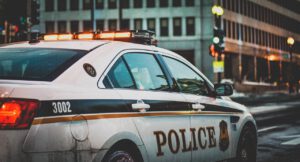By JOHN F. BANZHAF. Originally published at ValueWalk.

Gov. Glenn Youngkin Reacts to Pressure re: Protests; But Seeks to Deflect Legal Responsibility to Biden Administration
Youngkin Reacts To Protest At Homes
Virginia Governor Glenn Youngkin has reacted to growing pressure to do something to stop activists, who continue to illegally protest at the homes of conservative Supreme Court justices, by requesting that Attorney General Merrick Garland take action under a federal statute which prohibits picketing or parading in or near a building or residence occupied or used by a judge if it is done “with the intent… of influencing any judge…, in the discharge of his duty.”
Q1 2022 hedge fund letters, conferences and more
But that statute may not provide the basis for arrests or other law enforcement action by federal law enforcement officials because it requires a specific “intent” to influence a judge; something protestors are denying by claiming that they are simply expressing their outrage, and have no intent of trying to influence justices since their minds appear to be already made up.
In asking the Biden administration to protect the justices, Youngkin is seeking to deflect legal responsibility from himself, and from his own legal duty to enforce the laws of Virginia, since a Virginia statute makes protesting near any residence a crime even if completely peaceful, and without the need to establish any specific intent, charges public interest law professor John Banzhaf.
The law professor, whose formal complaint triggered a criminal investigation of former president Donald Trump in Georgia, and helped obtain Special Prosecutors to investigate then-president Richard Nixon, send a formal demand for the enforcement of this Virginia statute to Youngkin on May 7th.
In it Banzhaf put the Governor and his staff on legal notice of Virginia’s § 18.2-419. “Picketing or disrupting tranquility of home,” which mandates that: ”Any person who shall engage in picketing before or about the residence or dwelling place of any individual, or who shall assemble with another person or persons in a manner which disrupts or threatens to disrupt any individual’s right to tranquility in his home, shall be guilty of a Class 3 misdemeanor.” He explained:
“Please note that the statute does not criminalize only picketing done with a specific intent, but rather makes criminal any and all picketing, as well as any activity which disrupts “tranquility,” at any “residence or dwelling place of any individual” in Virginia. This is important because the corresponding federal statute, § 18 U.S.C. 1507, only makes picketing or parading in or near a building or residence occupied or used by a judge criminal if it is done “with the intent . . . of influencing any judge . . ., in the discharge of his duty. Thus it is not clear that any federal officers [e.g.. U.S. Marshals, member of the Secret Service, Supreme Court police, etc.] who might be on scene would – or even legally could – arrest persons who picket or protest near a justice’s residence in Virginia without direct evidence in their possession of the specific intent which the federal statute requires. It is even more doubtful that they would or even legally could arrest protestors for violating Virginia’s criminal statute.”
Enforcing The Statute
He also reminded Youngkin of how strongly the legislators feel about the statute, and about its need for enforcement, writing:
The legislature of Virginia, in its declaration of policy for this statute [Section 18.2–418], has made it abundantly clear that it regards such demonstrations as serious crimes which must be met with arrests: “protection and preservation of the home is the keystone of democratic government”; “good order of the community require that members of the community enjoy in their homes a feeling of well-being, tranquility, and privacy”; “picketing before or about residences and dwelling places causes emotional disturbance and distress”; “its object [is] the harassing of such occupants”; and enforcing the provisions of the statute “are necessary in the public interest, to avoid the detrimental results herein set forth.”
After receiving the legal demand for enforcement of the statute, Virginia Attorney General Jason Miyares urged commonwealth attorneys to enforce state law, making protests at the home of Supreme Court justices and others a crime, by arresting and prosecuting those who participate.
Miyares announced that: “Section 18.2-419 of the Code of Virginia states that protesting in front of an individual’s private residence is a class 3 misdemeanor. Under Virginia law, local commonwealth attorneys are responsible for prosecuting violations of this statute. Attorney General Miyares urges every commonwealth’s attorney to put their personal politics aside and enforce the law.”
The law professor has pointed out that it seems clear that the legislators wrote the criminal statute, prohibiting demonstrations at private residences, to permit police to act when any such criminal activity begins, rather than waiting until it becomes violent.
That’s because, once such a demonstration becomes violent, it may be difficult to bring it under control, with arrests or otherwise, without causing injury to demonstrators, police, and perhaps innocent bystanders.
Protests at the homes of influential people can easily become violent and even terrifying, says Banzhaf, citing this example.
As described just last year by Senator Josh Hawley: ”Tonight while I was in Missouri, Antifa scumbags came to our place in DC and threatened my wife and newborn daughter, who can´t travel. They screamed threats, vandalized, and tried to pound open our door.” The Senator confessed that, as a result, his family was “terrorized.” Fortunately, a local magistrate did find probable cause under Virginia’s § 18.2-419 and issued a legal summons.
Banzhaf, a constitutional scholar, also noted that, according to the Washington Post “Yes, experts say protests at SCOTUS justices’ homes appear to be illegal.”
Updated on
Sign up for ValueWalk’s free newsletter here.



